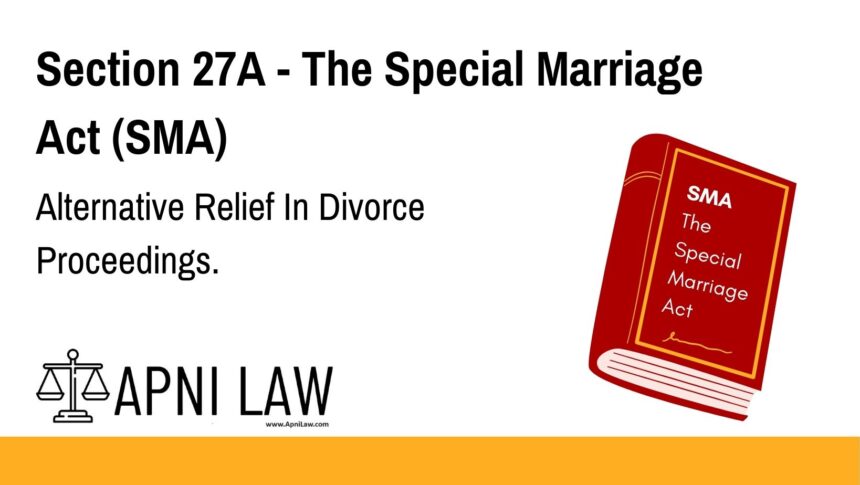Code: Section 27A of the Special Marriage Act, 1954
27A. Alternative relief in divorce proceedings.
In any proceeding under this Act, on a petition for dissolution of marriage by a decree of divorce, except insofar as the petition is founded on the ground mentioned in clause (h) of sub-section (1) of section 27, the court may, if it considers it just so to do having regard to the circumstances of the case, pass instead a decree for judicial separation.
Explanation of Section 27A – Alternative Relief in Divorce Proceedings
Section 27A of the Special Marriage Act provides an important alternative for individuals seeking divorce. This provision allows the court to grant judicial separation instead of a divorce decree, depending on the specific circumstances of the case. However, this relief is not available when the divorce petition is based on the ground mentioned in clause (h) of sub-section (1) of Section 27, which involves the presumption of death (i.e., the spouse being missing for seven years).
Key Features of Section 27A:
- Alternative to Divorce: Section 27A allows the court to grant judicial separation instead of divorce if the circumstances of the case justify such a decision.
- Exclusion of Clause (h): This provision does not apply if the petition for divorce is based on the presumption of death of one of the spouses, as mentioned in Section 27(1)(h).
- Discretion of the Court: The court has the discretion to choose whether to grant judicial separation instead of divorce, taking into account the facts and context of the case.
Illustration
Example 1: Alternative Relief in Divorce for Reconciliation
A couple has been living separately for two years due to marital issues. In a divorce petition, the wife expresses her desire to give the marriage another chance. The court may choose to grant a decree for judicial separation, allowing them to live separately without dissolving the marriage.
Example 2: Reconciliation Attempt with Alternative Relief
A husband files for divorce on the grounds of cruelty, but the wife asks for time to resolve their differences. The court may consider granting judicial separation, giving them a chance to reconcile before the final dissolution of the marriage.
Common Questions and Answers on Section 27A
1. What is the purpose of judicial separation under Section 27A?
Judicial separation allows the spouses to live separately legally without ending the marriage. It offers a chance for reconciliation before considering divorce.
2. Can the court deny judicial separation if the petitioner requests it?
Yes, the court has discretion and may decide that judicial separation is not appropriate based on the circumstances presented.
3. Is judicial separation permanent?
No. Judicial separation is a temporary relief, and the court may later grant a divorce or reconcile the parties depending on the situation.
4. When is judicial separation not available under Section 27A?
It is not available when the divorce petition is based on the ground of the spouse being presumed dead (as per Section 27(1)(h)).
5. Can judicial separation be converted into a divorce?
Yes, after a judicial separation, either spouse may file for a divorce if they continue to live separately for an extended period or if reconciliation fails.
Conclusion
Section 27A of the Special Marriage Act offers a valuable alternative for individuals seeking divorce but who may benefit from a period of judicial separation. This provision is designed to provide flexibility, offering a chance for reconciliation in certain cases while still legally acknowledging the separation between the spouses.
If you need legal assistance in filing for divorce or judicial separation, consult a professional to ensure your rights are protected. Visit ApniLaw for more information.








